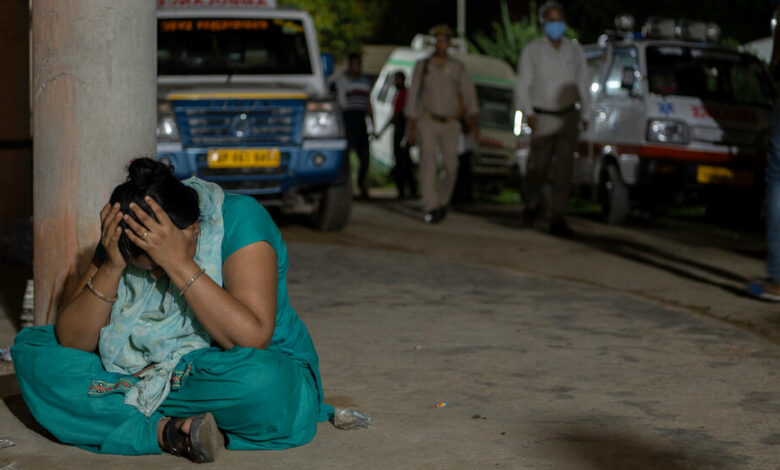They came for a spiritual revival, but got caught up in a deadly panic

At one point, a crowd of tens of thousands of people, almost all women, stood chanting and swaying in devotion to a revered holy man standing before them on stage, all packed together under a sprawling tent in northern India.
But when the guru left, people began pushing and shoving to get out of the cramped and still stifling heat under the pavilion. Some began to fall, either onto the muddy field below or into an adjacent ditch. There was panic and screaming. Bodies were strewn everywhere.
By Tuesday evening, the toll of the tragedy in Hathras district, Uttar Pradesh state, was devastating: at least 121 people, mostly from poor communities, were dead. Dozens were injured.
For the families, the search for the remains lasted until after midnight and they visited several hospitals.
At the Bagla Combined District Hospital, where 34 victims were taken, bodies lay on melting ice sheets that lined the corridor. Faces bore the marks of the afternoon’s horrific stampede — a slick of mud clinging to hair, dried drops of blood on skin. The green carpet in the corridor was soaked with slush and mud from the shoes and slippers of distraught relatives.
Outside, on the porch, dozens more sheets of ice were piled up. Ambulances brought in a steady stream of the dead. A police officer went from body to body, accompanied by family members, recording details in a red journal.
A husband, crouched on the wet floor beside his wife’s body, banged his head against the hallway wall. A grandfather clutched the tiny fingers of his only grandchild. A son bent over to examine his mother’s body.
The eerie silence in the hospital was regularly broken by heart-rending cries of grief when a victim was recognized.
The holy man — Narayan Sakar Hari, or Bhole Baba, as he is better known — was a government official before he styled himself as a Hindu guru and began drawing huge crowds. Villagers said he had become an icon for Dalit women, at the bottom of India’s rigid caste system, who have historically been marginalized as “untouchables” and denied access to temples.
The crowd had arrived for Tuesday’s rally on buses, trains and taxis before streaming to a tent set up on farmland near the highway. They had come from all over the state, some walking from neighboring counties. Some had come alone, others with neighbors, friends, children or grandchildren. It was a gathering they absolutely did not want to miss.
Hans Kumari, 40, had arrived in a taxi with 10 other women. She had begun following Bhole Baba in the hope of finding a cure for her chronic health problems: pain in her knees and trouble sleeping. Some women in the village had told her that the holy man could help her, so she began attending his meetings regularly.
“Yesterday we got there early to get a good seat,” she said.
Mrs. Kumari said there was a commotion after Bhole Baba finished his sermon, left the stage and drove away in a vehicle.
“People started running like crazy. It was mostly women,” she said. “I slipped in a ditch and waded across what looked like a bed of corpses. I saw two dead women and a child under my feet. Body on body.”
Ms Kumari said she survived, with bruises on her scalp and all over her body, by “keeping her head down and her hands outstretched to keep cutting.”
Others were less fortunate.
“The bus carrying the devotees had returned to the village. My mother was not in it,” said Bunty Kumar, 29, disheveled and with tears in her eyes as she arrived at the government hospital. “We eventually found a photo of her on an ice sheet on the Internet. That’s when we realised she was dead.”
Saudan Singh, 62, a farmer, sat quietly beside the body of his only grandchild, Rehanshu, 2, who lay on a sheet of ice, his short hair sticking out in all directions. Part of his yellow T-shirt peeked out from under a white sheet. His father was too distraught to identify his body.
Mr. Singh said that Rehanshu had come in a bus with his mother, who was a devotee and often visited the spiritual revivals. He lost both of them.
“He came with his mother in a bus,” Mr. Singh said. “She had attended many of his sermons earlier. I have also attended a few. He teaches us about brotherhood, humanity, peace and love.”
His grief was palpable as he described his love for the mischievous child. “My grandson called me ‘baba,'” he said. “He demanded sweets, bananas and cookies from me.”
Mujib mashal contributed reporting from New Delhi.




